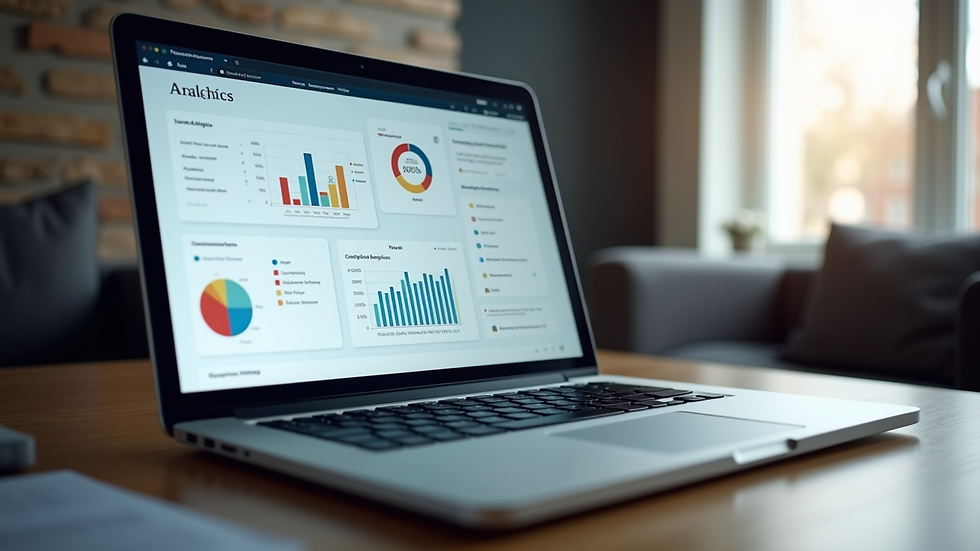Actionable Local SEO Strategies for Business Growth
- Steve Magno
- Oct 6, 2025
- 4 min read
In today's digital world, local businesses must leverage online visibility to attract nearby customers. Search engines prioritize local results, making it essential to optimize your online presence for local searches. Implementing proven local SEO strategies can significantly boost your business growth by driving more foot traffic, increasing calls, and improving sales. This article explores actionable steps to enhance your local SEO and stand out in your community.
Why Proven Local SEO Matters for Your Business
Local SEO focuses on optimizing your website and online profiles to appear in search results for location-based queries. For example, if someone searches "best coffee shop near me," local SEO helps your business show up in those results. This targeted approach connects you with customers who are ready to buy or visit.
Benefits of proven local SEO include:
Increased visibility in local search results and maps
Higher website traffic from nearby customers
More phone calls and in-store visits
Enhanced reputation through reviews and local listings
To achieve these benefits, businesses must implement specific strategies that align with search engine algorithms and user behavior.

Key Proven Local SEO Strategies to Implement Today
To grow your business locally, focus on these actionable strategies:
1. Optimize Your Google Business Profile
Your Google Business Profile (formerly Google My Business) is the cornerstone of local SEO. It appears in Google Maps and local search results, providing essential information like your address, hours, and contact details.
Steps to optimize your profile:
Claim and verify your business listing
Use a consistent business name, address, and phone number (NAP)
Add high-quality photos of your location, products, and services
Write a compelling business description with relevant keywords
Regularly update your hours and special offers
Encourage customers to leave reviews and respond promptly
2. Build Local Citations and Listings
Local citations are mentions of your business name, address, and phone number on other websites. These citations help search engines verify your business's legitimacy and location.
How to build citations:
Submit your business to reputable local directories (Yelp, YellowPages, etc.)
Ensure NAP consistency across all listings
Avoid duplicate or outdated listings
Use local chamber of commerce or industry-specific directories
3. Create Location-Specific Content
Content tailored to your local audience improves relevance and search rankings. This can include blog posts, landing pages, or FAQs focused on your city or neighborhood.
Examples of local content:
"Top 5 reasons to visit [Your City] this summer"
"How [Your Business] supports the [Local Community]"
Event announcements or local news related to your industry
Incorporate local keywords naturally to attract nearby searchers.

4. Use Local Keywords Strategically
Keyword research is vital for targeting the right audience. Use tools like Google Keyword Planner or Ubersuggest to find keywords with local intent.
Tips for local keyword use:
Include city or neighborhood names in titles, headers, and meta descriptions
Use phrases like "near me," "in [location]," or "[service] in [city]"
Avoid keyword stuffing; keep language natural and user-friendly
5. Optimize for Mobile and Voice Search
Many local searches happen on mobile devices or through voice assistants. Ensure your website is mobile-friendly and loads quickly.
Mobile and voice optimization tips:
Use responsive design for all screen sizes
Simplify navigation and call-to-action buttons
Include conversational keywords for voice search queries
Implement structured data markup to help search engines understand your content
What are the 4 Types of SEO?
Understanding the different types of SEO helps you create a comprehensive strategy. The four main types are:
1. On-Page SEO
This involves optimizing individual web pages to rank higher. It includes keyword usage, meta tags, content quality, and internal linking.
2. Off-Page SEO
Off-page SEO focuses on external factors like backlinks, social media signals, and online reputation. Building quality backlinks from local websites can boost your authority.
3. Technical SEO
Technical SEO ensures your website is crawlable and indexable by search engines. It covers site speed, mobile-friendliness, secure connections (HTTPS), and structured data.
4. Local SEO
Local SEO targets location-based searches and includes optimizing your Google Business Profile, local citations, and localized content.
By combining these SEO types, you create a strong foundation for online success.

Leveraging Reviews and Social Proof for Local SEO
Customer reviews are a powerful tool for local SEO and building trust. Positive reviews improve your rankings and influence potential customers.
How to maximize reviews:
Ask satisfied customers to leave reviews on Google, Yelp, and Facebook
Respond to all reviews professionally, thanking positive feedback and addressing concerns
Showcase testimonials on your website and social media
Monitor your online reputation regularly
Social proof signals to search engines that your business is credible and popular in your community.
Tracking and Measuring Your Local SEO Success
To ensure your efforts pay off, track key performance indicators (KPIs) such as:
Local search rankings for target keywords
Website traffic from local searches
Number of calls and direction requests from Google Business Profile
Customer reviews and ratings
Conversion rates from local visitors
Use tools like Google Analytics, Google Search Console, and your Google Business Profile dashboard to gather data. Adjust your strategies based on insights to continuously improve.
Taking the Next Step with Local SEO
Implementing proven local SEO strategies is essential for business growth in a competitive market. By optimizing your online presence, engaging with your community, and monitoring your progress, you can attract more local customers and increase revenue.
For more detailed tips and updates on effective local SEO strategies, visit local seo strategies.
Start today by claiming your Google Business Profile and creating location-specific content. Your local customers are searching for you - make sure they find your business first.



Comments